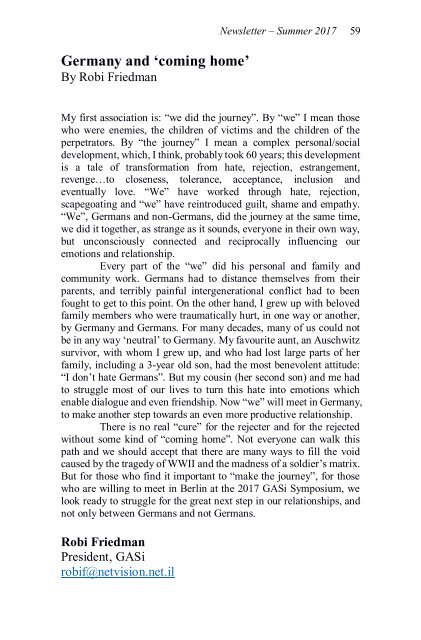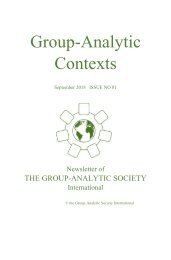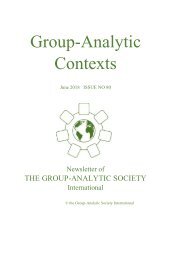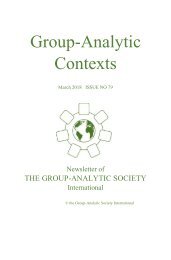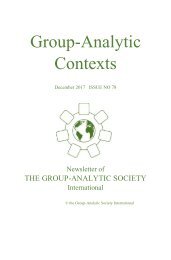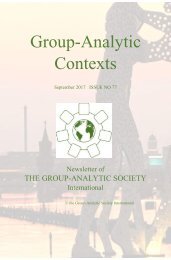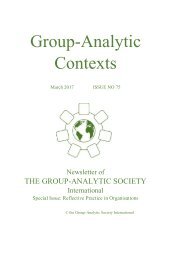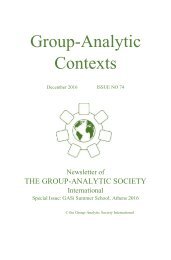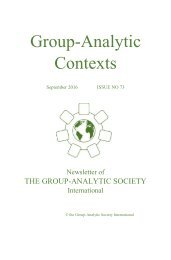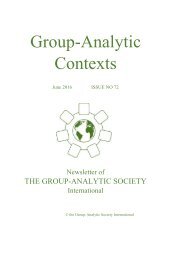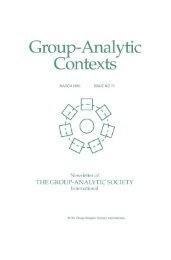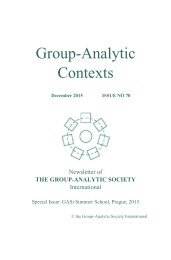Group-Analytic Contexts, Issue 76, June 2017
Special Issue: Preparing for the Berlin Symposium
Special Issue: Preparing for the Berlin Symposium
You also want an ePaper? Increase the reach of your titles
YUMPU automatically turns print PDFs into web optimized ePapers that Google loves.
Germany and ‘coming home’<br />
By Robi Friedman<br />
Newsletter – Summer <strong>2017</strong> 59<br />
My first association is: “we did the journey”. By “we” I mean those<br />
who were enemies, the children of victims and the children of the<br />
perpetrators. By “the journey” I mean a complex personal/social<br />
development, which, I think, probably took 60 years; this development<br />
is a tale of transformation from hate, rejection, estrangement,<br />
revenge…to closeness, tolerance, acceptance, inclusion and<br />
eventually love. “We” have worked through hate, rejection,<br />
scapegoating and “we” have reintroduced guilt, shame and empathy.<br />
“We”, Germans and non-Germans, did the journey at the same time,<br />
we did it together, as strange as it sounds, everyone in their own way,<br />
but unconsciously connected and reciprocally influencing our<br />
emotions and relationship.<br />
Every part of the “we” did his personal and family and<br />
community work. Germans had to distance themselves from their<br />
parents, and terribly painful intergenerational conflict had to been<br />
fought to get to this point. On the other hand, I grew up with beloved<br />
family members who were traumatically hurt, in one way or another,<br />
by Germany and Germans. For many decades, many of us could not<br />
be in any way ‘neutral’ to Germany. My favourite aunt, an Auschwitz<br />
survivor, with whom I grew up, and who had lost large parts of her<br />
family, including a 3-year old son, had the most benevolent attitude:<br />
“I don’t hate Germans”. But my cousin (her second son) and me had<br />
to struggle most of our lives to turn this hate into emotions which<br />
enable dialogue and even friendship. Now “we” will meet in Germany,<br />
to make another step towards an even more productive relationship.<br />
There is no real “cure” for the rejecter and for the rejected<br />
without some kind of “coming home”. Not everyone can walk this<br />
path and we should accept that there are many ways to fill the void<br />
caused by the tragedy of WWII and the madness of a soldier’s matrix.<br />
But for those who find it important to “make the journey”, for those<br />
who are willing to meet in Berlin at the <strong>2017</strong> GASi Symposium, we<br />
look ready to struggle for the great next step in our relationships, and<br />
not only between Germans and not Germans.<br />
Robi Friedman<br />
President, GASi<br />
robif@netvision.net.il


